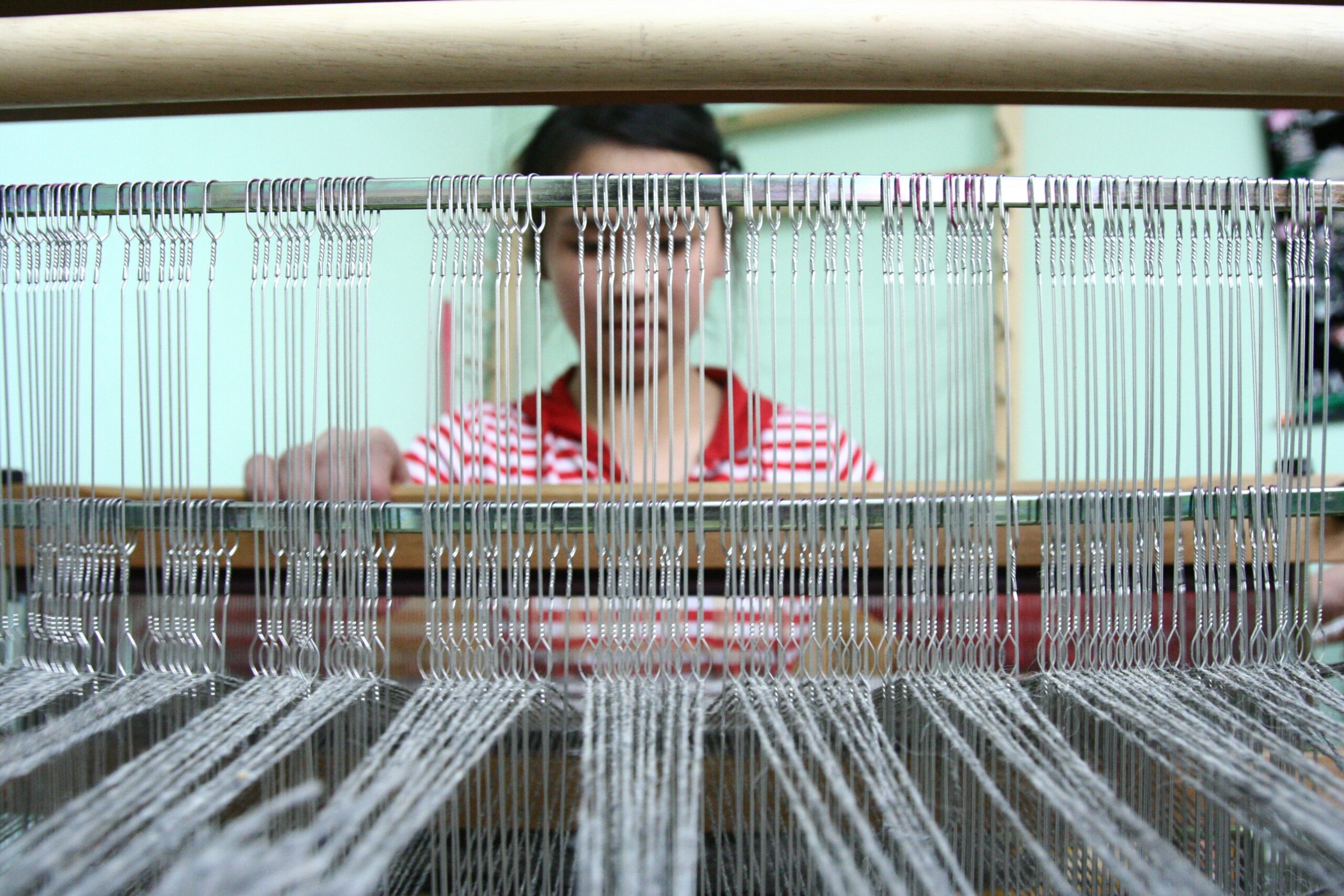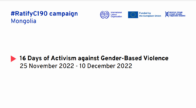Mongolia
The overall objective of the project is to improve labour relations and working conditions in alignment with sustainable development objectives.
Mongolia has ratified nine out of ten ILO Fundamental Conventions, including the recently elevated Occupational Safety and Health Convention, 1981 (No. 155). The project aims to promote decent work and sustain Mongolia’s eligibility as a beneficiary of the European Union Generalised Scheme of Preferences Plus (GSP+). It supports the Government and social partners in applying and reporting on ratified conventions to the ILO supervisory bodies, with a specific focus on enhancing the quality and timeliness of reporting. Additionally, the project fosters and facilitates ongoing dialogue among tripartite partners to promote and ratify the remaining ILO Fundamental Convention, specifically the Promotional Framework for Occupational Safety and Health Convention 187 (2006).

Objectives
The project aims to improve the application of and reporting on the ILO Fundamental Conventions in Mongolia through improved labour relations and working conditions.
Achievements
Primarily, the project collaborated with the Government to enhance national reporting capacity on ratified ILO Conventions. In parallel, the project supported efforts to harmonize national legislation with the provisions of these Conventions. In this regard, the project provided technical support to the National Tripartite Subcommittee on the Application of International Labour Standards to address comments from the ILO Committee of Experts on the Application of Conventions and Recommendations (CEACR). This collaboration facilitated the preparation of comprehensive reports to the ILO.
Following the approval of Mongolia’s new Labour Law in 2021, support was provided for the development of regulations crucial for its effective enforcement. Employing innovative communication strategies, the project produced 18 short videos and 10 comics to disseminate information about key provisions of the Labour Law. This initiative significantly enhanced public understanding and engagement via targeted social media campaigns and collaborations with the United Nations Youth Advisory Panel. These communication materials are widely used by the government, social partners, and NGOs for broader outreach.
Furthermore, the project empowered legal professionals by augmenting their knowledge and skills to enable them to utilise international labour standards in their practice. They benefited from tailored advanced training sessions conducted in collaboration with the International Training Centre of the ILO (ITCILO) and the Mongolian Bar Association.
Adopting a comprehensive approach, the project actively addressed workplace challenges such as violence, harassment, and child labour, while advocating for occupational safety and health. Notably, it spearheaded the development of policies, training modules, and the dissemination of critical resources like the ILO’ practical guide for employers on Violence and Harassment at Work.
Aligned with its objectives, the project strategically coordinated with the Ministry of Family, Labour and Social Protection (MFLSP) to organize a national policy discussion and comprehensive child labour training on the World Day Against Child Labour. Additionally, the project’s support to the National Human Rights Commission of Mongolia (NHRCM) in conducting a Child Labour Qualitative Study yielded invaluable insights, directly informing essential policy updates including revisions to the list of prohibited jobs for minors and the formulation of light work conditions for children.
The project also led a robust social media campaign during the 16 Days of Activism against Gender-Based Violence. Collaborating effectively with government bodies, UN agencies, and civil society organizations, the campaign significantly raised awareness among the public including young women and girls regarding gender-based violence and harassment in professional settings, while also promoting the Violence and Harassment Convention, 2019 (No. 190). This campaign had a significant impact and reached over 620,570 individuals through targeted social media channels.
Activities
In Mongolia, the project prioritises the following:
- Supporting the country in the effective implementation of ratified ILO Fundamental Conventions
- Supporting legal reform in the country to enhance the alignment of national law with ILO Fundamental Conventions
- Strengthening the capacities of institutions and social partners on international labour standards and Fundamental Principles and Rights at Work
- Strengthening the capacity of the country to meet its reporting obligations
Resources

News / Mongolia
“Promoting Workplace Safety: The ‘Safety at Work, Health Month Campaign’ Photo Challenge”
May 15, 2023

News / Mongolia
Influential voices of Mongolia call for zero tolerance for violence and harassment at work
January 31, 2023

News / Mongolia
16 Days of Activism against Gender-Based Violence
January 1, 2023

News / Mongolia
Tripartite partners use animation to promote the revised Labour Law of Mongolia
December 20, 2022
Fundamental Conventions and selected international labour standards and protocols ratified
Ratification of the Violence and Harassment Convention, 2019 (No. 190)
Advocating for the ratification of ILO Convention No. 190 (C190) by the Ministry of Family, Labour and Social Protection
The National Tripartite Agreement for 2023-2025 of the Labour and Social Partnership indicated that the social partners would study the ratification of C190. Several initiatives were undertaken by the project to support the ratification process.
Action
- In 2022, the project organized and facilitated a capacity-building training on ILO Convention No. 190 (2022), engaging five key representatives from government institutions, social partners, the National Human Rights Commission, and the National Committee for Gender Equality (NCGE)
- Designed and implemented a targeted social media campaign during the ‘16 Days of Activism Against Gender-Based Violence’ in 2022 and 2023, with a particular focus on raising awareness among young individuals in the workplace
- Provided technical assistance to employers’ organizations to strengthen their understanding and implementation of ILO Convention No. 190, focusing on strategies to prevent and address violence and harassment in the workplace
- Provided technical support to the Federation of Mongolian Apartment Public Utilities Service Workers’ Trade Union to carry out a situational analysis study on workplace harassment and violence in the housing and utilities sector in 2024
Results
- Enhanced participants’ knowledge and capacity to prevent and manage violence and harassment in the workplace, fostering a shared understanding of the principles and obligations under ILO Convention No.190
- Strengthened the institutional capacity of the National Committee for Gender Equality (NCGE) to independently initiate and deliver “Gender-Sensitive Workplace” training in collaboration with employers’ organizations
- The social media campaign achieved significant outreach, engaging 620,570 individuals through the official channels of the ILO and the National Human Rights Commission of Mongolia (NHRCM)
- Improved awareness and understanding among young women and girls regarding gender-based violence and harassment in the workplace, including key provisions and protections under ILO Convention No.190
- The Mongolian Employers’ Federation (MONEF) translated and adapted the ILO’s Practical Guide for Employers on Violence and Harassment
- The MONEF supported 10 enterprises in developing internal policies to prevent workplace violence and harassment in 2023
Constituents actively participate in national processes that address gaps between national law and practice and targeted conventions
Enhancing the alignment of national labour laws with International Labour Standards (ILS)
Supporting the enactment of rules to implement the new Labour Law
On 2 July 2021, the State Great Khural (Parliament of Mongolia) endorsed a new Labour Law, which entered into force on 1 January 2022. Following this, Mongolia approved five new policies on labour dispute resolution to enhance the effectiveness of the mechanism. The project provided technical support to the constituents to improve the labour dispute resolution mechanism following the commencement of the new law.
Action
- Provided technical support to constituents for the effective implementation of the new Labour Law, focusing on capacity building and practical application across sectors
- Developed a training manual on labour dispute resolution and delivered capacity-building training sessions to strengthen practitioners’ skills in 2023
- In 2024, the project organized a certification course on the conciliation of labour disputes in partnership with ITCILO
Results
- Seven new regulations were developed and adopted with the project support, strengthening the legal framework on labour dispute mediation/conciliation, arbitration, and child labour.
- With project support, the Ministry of Labour and Social Protection delivered capacity development trainings to 300 labour dispute practitioners from the General Agency for Labour and Welfare Service at the local level, as well as to Tripartite Committees at district and aimag levels, thereby strengthening institutional capacity for effective labour dispute resolution
- Trained 22 mediators/conciliators, and arbitrators, including members of the Tripartite Labour Rights Dispute Settlement Committee and staff from the General Agency for Labour and Welfare Services
- The conciliation of labour disputes training enhanced participants’ capacity to identify the root causes of labour disputes and apply effective conciliation techniques, thereby strengthening Mongolia’s institutional framework for labour dispute resolution
Supporting initiatives to increase awareness and facilitate the implementation of the new Labour Law
The project facilitated and supported training and awareness-raising campaigns on the new labour law to capacitate members of the Ministry of Family, Labour and Social Protection (MFLSP), and the social partners.
Action
- Organized trainings to raise awareness and support the implementation of the new Labour Law, targeting key stakeholders to ensure effective understanding and application of the revised legal provisions
- Provided advanced training to 36 legal professionals on international labour standards in collaboration with ITCILO and the Mongolian Bar Association
- Developed knowledge products to increase public awareness and understanding of the new Labour Law
- 1. 18 short videos were developed in collaboration with the MFLSP, highlighting key provisions of the new Labour Law
- 2. 10 comics were produced in collaboration with the United Nations Youth Advisory Panel on Labour Law, specifically targeting youth
- In 2024, the project continued its awareness efforts by producing short social media reels that highlighted the importance of labour dispute resolution mechanisms under the new Labour Law
Results
- The knowledge of 1,000 civil servants and representatives of employers and workers on the new Labour Law was enhanced across 21 provinces and 9 districts of Ulaanbaatar city
- Capacitated 36 legal professionals to apply international labour standards in their legal practice
- Enhanced public awareness and understanding of certain key aspects of the new labour legislation
- Three short video reels on labour dispute resolution mechanisms under the new Labour Law reached over 26,000 people via social media.
- Training participants reported effectively utilising the skills garnered to resolve labour disputes, demonstrating strengthened capacity
Supported the Government in the initiative to eliminate child labour
Revision of the list of jobs prohibited for minors and approved light work conditions for children
Mongolia has ratified the Worst Forms of Child Labour Convention, 1999 (No. 182) and the Minimum Age Convention, 1973 (No. 138). In light of this, Mongolia revised the list of jobs prohibited for minors and approved light work conditions for children in 2022 with the support of the project.
Action
- In 2022, in collaboration with the National Human Rights Commission of Mongolia (NHRCM), the project launched the Child Labour Qualitative Study
- Supported the Mongolian National University of Education (MNUE) in developing a child labour training module aimed at equipping future educators with the knowledge and tools to identify, prevent, and respond to child labour issues in educational settings
- Organized a national contest in 2022 to raise awareness on child labour, engaging over 120 university students across five creative categories
- Organized annual national policy consultations in collaboration with social partners and key stakeholders on the World Day Against Child Labour from 2021 to 2025
Results
- The findings of the Child Labour Qualitative study informed two important policy updates:
- 1. The revised list of jobs prohibited for minors in 2022
- 2. The development of light work conditions for children
- The MNUE delivered the child labour training module to over 1,700 social work students between 2023 and 2025, enhancing their capacity to identify and address child labour
- Policy recommendations were developed and endorsed by the Ministry of Family, Labour and Social Protection during the national conference
Supporting the implementation of the Occupational Safety and Health Convention, 1981 (No. 155)
Revision of the national legislation
In addition to promoting the ratification of ILO Convention No. 182, the project supports the Ministry of Labour and Social Protection (MFLSP) to revise the Law on Occupational Safety and Health.
Action
- In 2023, the project co-organized a nationwide Photo Challenge as part of the “Safety at Work, Health Month Campaign,” in collaboration with the MFLSP and the National Committee for Occupational Safety and Health
- In 2024, the project provided technical support to the MFLSP to revise the Occupational Safety and Health Law, aligning national legislation with international standards
Results
- In 2025, the MFLSP made significant strides in the revision of the Occupational Safety and Health Law by establishing two technical working groups
- Raised awareness on occupational safety and health among more than 1,600 participants from 100+ organizations, particularly in high-risk sectors such as mining, construction, energy, and manufacturing
Enhanced constituents' capacity on International Labour Standards and Responsible Business Conduct
Building the capacity of constituents on Responsible Business Conduct
Support to strengthen the awareness of Mongolian tripartite constituents on Responsible Business Conduct and the ILO Tripartite Declaration of Principles concerning Multinational Enterprises and Social Policy (MNE Declaration)
In 2021, the Mongolian Employers’ Federation (MONEF) developed HELPDESK, which is a new panel/section on the main webpage of the MONEF that aims to inform businesses and potential investors about international labour standards and the newly adopted Labour Law.
Action
- The project supported the participation of Mongolian representatives in the training on International Labour Standards and Responsible Business Conduct: The Labour Dimension of Human Rights Due Diligence, held in Turin, Italy, in November 2023
- In 2024, project supported the participation of Mongolian government officials, law researchers, and social partners in the ILO training on International Labour Standards and Responsible Business Conduct: The Labour Dimension of Human Rights Due Diligence
Results
- Tripartite constituents-including representatives Participants from the ministries, trade union, law researchers and social partners enhanced their understanding and practical application of Responsible Business Conduct and Human Rights Due Diligence
Tripartite constituents effectively fulfil their respective roles in reporting to the ILO supervisory bodies
The drafting and validation of country reports on international labour instruments
Supporting the National Tripartite Subcommittee to draft reports on ratified conventions
The tripartite sub-committee on the application of international labour standards was established and supported in the reporting on ratified conventions. This ensured the timely submission of good-quality, comprehensive reports to the ILO supervisory bodies with no reports outstanding.
Action
- Organized workshops and provided technical assistance to strengthen the Government’s capacity to prepare and submit reports to ILO supervisory bodies
Results
- Enhanced the Government’s capacity to fulfil its reporting obligations
- Provided continued technical support, contributing to the submission of 19 reports to CEACR between 2021 and 2024, with no reports overdue
Supporting the Government and the social partners to effectively contribute to the reporting procedure
In addition to collaborating with the National Tripartite Subcommittee, the project strengthened the awareness of the Government and social partners on the best practices in international labour standards reporting, thereby capacitating them.
Action
- Launched the Mongolian version of the Handbook of Procedures relating to International Labour Conventions and Recommendations in 2022 with project support
Results
- Improved access to procedural guidance for government officials and social partners through the launch of the Handbook, supporting effective implementation of international labour standards